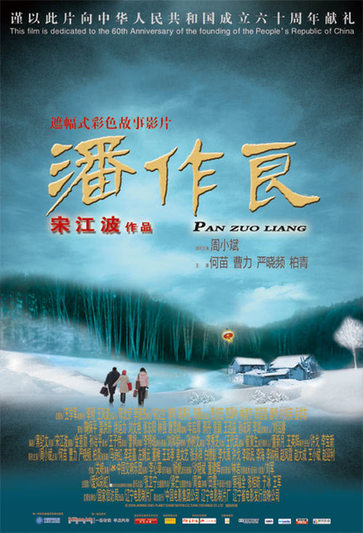 |
|
A poster of "Tie Ren" |
In China, there is a type of movie whose tickets are bought up by the authorities on behalf of their staff. These movies usually depict saintly individuals who turn out to be Communist party members, or historical events from the perspective of the Party. Commonly known as "main melody" movies, their appeal to a general audience is limited by a lack of intriguing plots or convincing characters.
China has a long tradition of "main melody" movies. Though limited in popularity, some have managed to bring in substantial box office receipts. In recent years one or two works of this kind have gained enormous popularity. Director Feng Xiaogang's Assembly (Ji Jie Hao, 2007) grossed about 260 million yuan (about US$38 million) in general ticket sales. This year's City of Life and Death has earned over 160 million yuan (about US$ 23 million) to date. Such examples have served to convince the authorities of the commercial viability of such movies. Han Sanping, president of the China Film Group said, "All movies, while endeavoring to maintain high artistic quality, should make profitability their prime goal."
But most movies in this category do not have a big audience draw. General moviegoers, especially young people, are not interested in this kind of movie, and are reluctant to spend their money on them. However, with China's 60th anniversary celebrations approaching and its movie markets booming, movie makers have formed the ambition of turning their Party-themed movies into blockbusters. Can it be done? Yes, but only with the help of the government.
When the biopic movie Tie Ren (aka Iron Man) about model oil worker Wang Jinxi came out on May 1, director Yin Li was incredibly confident, claiming his movie would earn more than 100 million yuan in ticket sales (about US$14.7 million).
But the reality was somewhat less encouraging. Some local regional unions even ignored the All China Federation of Trade Unions' (ACFTU) instructions to arrange for their employees to see the movie. They said they wanted to rent the reels and project the movie themselves. But the cost of this turned out to be ridiculous - 10 thousand yuan, about twice the ordinary price.
As of May 22, the movie had grossed only about 3 million yuan (US$439 thousand) in ticket sales across the country.
Neither the authorities nor the director were happy about the poor sales. In mid-May, representatives from the State Administration of Radio, Film and Television (SARFT), the ACFTU, theaters and film production companies held a conference to improve the promotion of the film. They agreed to re-release it on a larger scale, increase the publicity spend, and screen it until September.
Thanks to this additional support, the movie has seen its box office improve by 1 million yuan per day, and it has now earned over 20 million yuan (US$3 million).
Compared with Tie Ren, the movie Pan Zuoliang, about the life of a government official after whom the movie is named, has had a much smoother path to achieving its box office goal of 100 million yuan.
 |
|
A poster of movie "Pan Zuoliang" |
First of all, the title character, Pan Zuoliang was a very competent, diligent and caring official. A sufferer from serious illness, he continued to work hard and eventually collapsed at work, dying from a cerebral hemorrhage in May 2008. He has been held up as an example for all government officials to follow - President Hu Jintao himself has called for the nation's officials to emulate Pan's dedication. Following his death, a group toured the country to deliver lectures about his life.
Subsequently, the film's producers decided that a movie about Pan was a really strong idea, and they could certainly make it into a profitable venture. After the movie was complete, the production company held several preview screenings, inviting a large number of government officials and well-known critics to see the movie.
As a result, the Liaoning provincial government approved the movie and gave it an official designation as education material for Party members. This was what the movie producers had been hoping for. Producer Liu Yanbing explained that in comparison with written texts, the movie could provide Party members with a much more vivid example of how to serve the public.
As the promotion gained momentum, the movie began to develop a high reputation among officials. With the acclaim and approval of central government, it could be shown to Party members all over the country. This guaranteed an incredibly large audience numbering many millions. The movie is likely to become another blockbuster - the producers have no need for any further concerns about box office receipts.
Like Pan Zuoliang, a new biopic movie about Chinese nuclear science pioneer Deng Jiaxian is turning to the government for support. Not only is its production funded by the government, but it is also targeting government officials as its main audience.
As one producer acknowledges, the commercial success of such movies depends entirely on connections with the authorities.
(China.org.cn by Pang Li June 30, 2009)